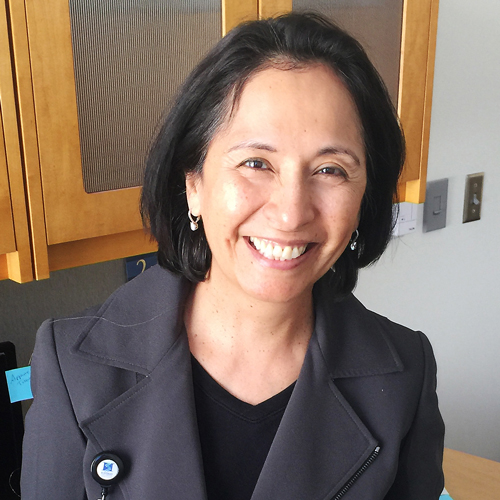Cisco System’s Latino employee resource group (ERG), Conexión, dedicates and focuses its efforts toward encouraging students to pursue careers in science, technology, engineering, and math (STEM). The efforts came to an international pinnacle in August 2015, when Cisco System and the University of Technology of Chile (INACAP) teamed up to offer a free weeklong seminar, “Developing Local Talent through Technology (DLTT).”
Cisco software engineer and Conexión board member Juan Del Villar worked with INACAP and the Cisco team in Chile to bring the seminar to the INACAP Santiago Sur campus. He recruited team members, welcomed the students and INACAP authorities, and also served as an instructor. A native of the Dominican Republic, Del Villar has always had a passion for technology and was motivated to establish the DLTT seminar, knowing how critical it is to have hands-on experience in his field.
Cisco customer solutions manager, Munira Nasser Webb was responsible for teaching the professional development sessions at the seminar. In addition to serving on the board of Conexión, Nasser Webb is also a member of two other Cisco ERGs: WISE (women in science and engineering) and CW (connected women). A Chilean herself, she was able to translate not just technical terms for the students, but also the more nuanced chilenismos for her Cisco
colleagues.
The two join Hispanic Executive to talk about the importance of the DLTT programs and other initiatives like it.
HE: What were Cisco’s main goals with the Developing Local Talent Through Technology seminar?
Juan Del Villar: When we presented the DLTT seminar to our potential host, we had several goals in mind. The main one was to deliver a four-day training workshop on technical and soft skills to participants who come from the educational sector as well as public and private enterprises. Other goals included increasing Cisco’s brand awareness and providing technology training that would be beneficial to the information and communications technology (ICT) workforce.
The seminar was also intended to motivate women to study technical careers. What other steps is Cisco taking in that direction?
Munira Nasser Webb: Cisco is a tremendous supporter of women in STEM careers. Among our employee resource groups or organizations, we have several that specifically focus on women in the IT field. Those ERGs not only provide an internal platform for Cisco female professionals, but also work with outside organizations to promote STEM careers among girls and women. Cisco also works with schools, colleges, and universities. For example, we host a global “Girls in IT” day every year to encourage middle school girls to consider IT careers.
Why was INACAP in Chile chosen for the seminar?
Nasser Webb: INACAP is a leading educational institution with a focus on technology. It uses a “learning by doing” methodology, which allows the students to put their knowledge into practice from the very first year. So, a hands-on seminar like this one was very applicable to them. INCAP videotaped all the sessions and plans to incorporate them into their regular curriculum.
Del Villar: This was the second annual DLTT, after executing the first one in Peru last year. And it is just the start. We hope to bring DLTT to other Latin American countries and open the doors of opportunity to upcoming talent that has limited resources in the area of technical instruction. This second DLTT seminar was successful. The feedback and experience has been so good that INACAP has invited us to other technology events that they run throughout the year. We have heard some of our Latino coworkers talk about the lack of personnel with technical expertise in several of Latin American countries. To breach this gap, we are starting to work with these Cisco employees to promote DLTT and to increase not only the technical training program but also use DLTT as recruiting tool in areas of need for Cisco.
So is the seminar officially an annual event?
Del Villar: That’s the goal. Right now the DLTT team is focused on Latin America, having brought the event to Peru and Chile in the last two years. Countries that are also on our radar include Costa Rica, Colombia, Brazil, and Mexico with possibilities to also bring the program to Argentina and the Dominican Republic.
What was your personal experience like during the seminar?
Del Villar: It gave me great satisfaction to know that the students got the chance to see first-hand how innovative technologies like Voice Over IP, Network Security, Virtualization, and others really work. Just seeing the look on the students’ faces when they got to make things work was awesome.
Nasser Webb: It was wonderful not only to see the interest the students had in technology, but also to hear about their own experiences and challenges. We covered topics like résumé writing, communication, presentation, and interviewing skills. Some of the concepts were foreign to them because they come from a different culture, yet you could tell that these new ideas are slowly but surely becoming part of their personal work standards.
What makes you so invested in bringing this high-level of technological training to Latin America?
Del Villar: The most important thing in training for a career in technology is the hands-on experience. I tell the students that the theory we present can be found on the Internet, but it is really hard for most of us to get our hands on real equipment and devices and play with them.
Nasser Webb: On a personal note, it is extremely important for me to promote STEM among girls and women, especially where there is a high level of disparity. I have two daughters, and I want to inspire them. Some believe that girls will find a career in IT too “boring” or that it means sitting in front of a computer all day. We are lucky to work for a company like Cisco that offers many possibilities to women in the different areas of technology.

